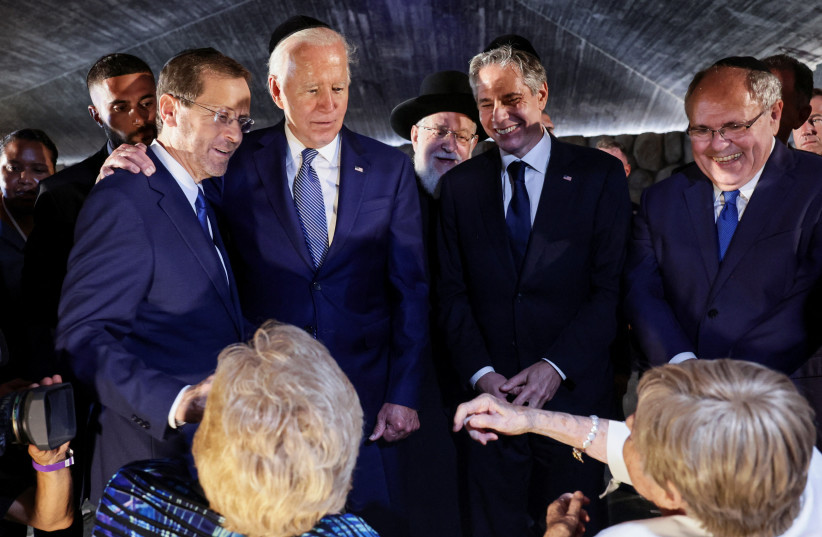US-Israel ties have traveled light years since president John F. Kennedy first declared the relationship “special” during a meeting with then-foreign minister Golda Meir in 1962.
Although a year later, in a letter to then-prime minister Levi Eshkol, Kennedy rejected David Ben-Gurion’s request for a formal alliance between the two countries, ever since then – through layers and layers of various proclamations, memoranda of understanding and acts of Congress – such a de facto alliance has developed.
US President Joe Biden is likely to add another layer on Thursday when he is expected to present what is being dubbed the “Jerusalem Declaration,” a proclamation that will reaffirm America’s commitment to Israel’s security, including ensuring its qualitative military edge (QME) so that the Jewish state can defend itself, by itself, against any threat or combination of threats.
In addition, the proclamation is expected to be unequivocal regarding Iran’s nuclear march, likely to say that Israel and the US will use “all elements of national power” to make sure that Iran never attains nuclear arms.
Though such a proclamation is only declaratory, and – unlike memoranda of understanding or acts of Congress – is not legally binding, it is still highly significant for the messages it sends.

The general message this sends to friends and foes alike is that the US-Israel relationship is unshakable and that America has Israel’s back. While some may say this is a given, it is not, and bears being repeated over and over, and by one president after the next. As the old aphorism goes, “Even that which need not be stated, needs to be stated from time to time.”
Why? So that people – Israel’s enemies in the region and Israeli detractors in the US – do not interpret policy differences as evidence of an erosion in the relationship. This type of proclamation says that the relationship is rock-solid even though there may be disagreements over policy. It is also significant coming from a Democratic president at a time when some progressives in his party are increasingly questioning the US-Israel relationship.
US, Israel agree on Iran
The declaration on Iran sends a message that while the US and Israel may disagree on how best to prevent Iran from obtaining nuclear weapons, and about whether Iran needs to be stopped, they are in total agreement on the need to prevent the Islamic Republic from getting nuclear arms, and will ensure that it is unable to do so.
Coming at a time when the nuclear talks with Iran are on the verge of collapse, when Tehran is moving perilously close to the nuclear threshold, and as Russian President Vladimir Putin is scheduled to meet in Iran next week with its leaders, this is not a message being sent in a vacuum.
In addition, the reaffirmation that will come in the proclamation regarding Israel’s QME – something already anchored in congressional legislation – is important now considering the multi-billion dollar arms deals the US has signed, and is in the process of signing, with the Gulf countries, including Saudi Arabia.
Reaffirming Israel’s QME now means that the US pledges to uphold it even in the Abraham Accords era, when the major recipients of US arms – such as the United Arab Emirates and Bahrain – are at peace with Israel. But what happens if there are seismic changes in those countries, or in Saudi Arabia, and the rulers are overthrown? Israel will still need to have a military edge on them, and this commitment reaffirms that.
This proclamation further anchors the close strategic ties between the countries. The tighter that knot is tied, the better.
Problems with the “Jerusalem Declaration”
It is worth noting, however, that this is a proclamation and has no legal standing. There have been other such declarations made by US presidents toward Israel in one form or another – such as George W. Bush’s famous letter to Ariel Sharon – that had a shelf life of the duration of that president’s tenure, but which can – as Barack Obama did with the Bush letter – later be largely disregarded
Biden’s proclamation is a powerful declaration of friendship, for which Israel should be extremely grateful. It is not, however, a treaty or legally binding document. There is a difference, and both Israel’s policymakers and the public would do well to keep that in mind.
